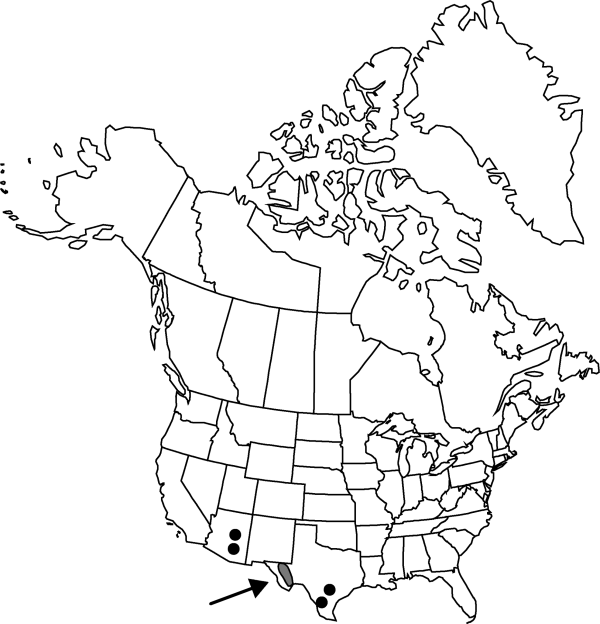Difference between revisions of "Opuntia engelmannii var. linguiformis"
Madroño 35: 347. 1988.
Common names: Cow’s tongue pricklypear
Basionym: Opuntia linguiformis Griffiths Rep. (Annual) Missouri Bot. Gard. 19: 270, plate 27 (lower). 1908
Synonyms: Opuntia lindheimeri var. linguiformis (Griffiths) L. D. Benson
FNA>Volume Importer |
imported>Volume Importer |
||
| (7 intermediate revisions by 2 users not shown) | |||
| Line 8: | Line 8: | ||
}} | }} | ||
|common_names=Cow’s tongue pricklypear | |common_names=Cow’s tongue pricklypear | ||
| − | |basionyms={{Treatment/ID/ | + | |basionyms={{Treatment/ID/Basionym |
|name=Opuntia linguiformis | |name=Opuntia linguiformis | ||
|authority=Griffiths | |authority=Griffiths | ||
| + | |rank=species | ||
| + | |publication_title=Rep. (Annual) Missouri Bot. Gard. | ||
| + | |publication_place=19: 270, plate 27 (lower). 1908 | ||
}} | }} | ||
|synonyms={{Treatment/ID/Synonym | |synonyms={{Treatment/ID/Synonym | ||
|name=Opuntia lindheimeri var. linguiformis | |name=Opuntia lindheimeri var. linguiformis | ||
|authority=(Griffiths) L. D. Benson | |authority=(Griffiths) L. D. Benson | ||
| + | |rank=variety | ||
}} | }} | ||
|hierarchy=Cactaceae;Cactaceae subfam. Opuntioideae;Opuntia;Opuntia engelmannii;Opuntia engelmannii var. linguiformis | |hierarchy=Cactaceae;Cactaceae subfam. Opuntioideae;Opuntia;Opuntia engelmannii;Opuntia engelmannii var. linguiformis | ||
| Line 23: | Line 27: | ||
}}<!-- | }}<!-- | ||
| − | --><span class="statement" id="st- | + | --><span class="statement" id="st-undefined" data-properties=""><b>Stem </b>segments lanceolate to narrowly lanceolate, becoming very elongate, often falcate, 35–120+ × 8–17.5 cm, 2+ times longer than wide. <b>Spines</b> 0–3 per areole, absent or irregularly to regularly arranged at most distal areoles, yellow, aging blackish, longest 12–30 mm. <b>2n</b> = 66.</span><!-- |
-->{{Treatment/Body | -->{{Treatment/Body | ||
| + | |phenology=Flowering spring (Apr–May). | ||
|habitat=Deserts | |habitat=Deserts | ||
|elevation=100-600 m | |elevation=100-600 m | ||
|distribution=Ariz.;Tex.;Mexico (Coahuila). | |distribution=Ariz.;Tex.;Mexico (Coahuila). | ||
| − | |discussion=<p>Opuntia engelmannii var. linguiformis is widely cultivated, at times escaping and becoming established in native desert vegetation. It was questionably reported to be native in Bexar County, Texas (D. Weniger 1984).</p> | + | |discussion=<p><i>Opuntia engelmannii </i>var.<i> linguiformis</i> is widely cultivated, at times escaping and becoming established in native desert vegetation. It was questionably reported to be native in Bexar County, Texas (D. Weniger 1984).</p> |
|tables= | |tables= | ||
|references= | |references= | ||
| Line 38: | Line 43: | ||
-->{{#Taxon: | -->{{#Taxon: | ||
name=Opuntia engelmannii var. linguiformis | name=Opuntia engelmannii var. linguiformis | ||
| − | |||
|authority=(Griffiths) B. D. Parfitt & Pinkava | |authority=(Griffiths) B. D. Parfitt & Pinkava | ||
|rank=variety | |rank=variety | ||
| Line 45: | Line 49: | ||
|basionyms=Opuntia linguiformis | |basionyms=Opuntia linguiformis | ||
|family=Cactaceae | |family=Cactaceae | ||
| + | |phenology=Flowering spring (Apr–May). | ||
|habitat=Deserts | |habitat=Deserts | ||
|elevation=100-600 m | |elevation=100-600 m | ||
| Line 52: | Line 57: | ||
|publication year=1988 | |publication year=1988 | ||
|special status= | |special status= | ||
| − | |source xml=https:// | + | |source xml=https://bitbucket.org/aafc-mbb/fna-data-curation/src/2e0870ddd59836b60bcf96646a41e87ea5a5943a/coarse_grained_fna_xml/V4/V4_254.xml |
|subfamily=Cactaceae subfam. Opuntioideae | |subfamily=Cactaceae subfam. Opuntioideae | ||
|genus=Opuntia | |genus=Opuntia | ||
|species=Opuntia engelmannii | |species=Opuntia engelmannii | ||
|variety=Opuntia engelmannii var. linguiformis | |variety=Opuntia engelmannii var. linguiformis | ||
| − | |||
| − | |||
| − | |||
| − | |||
| − | |||
| − | |||
| − | |||
| − | |||
| − | |||
| − | |||
| − | |||
}}<!-- | }}<!-- | ||
-->[[Category:Treatment]][[Category:Opuntia engelmannii]] | -->[[Category:Treatment]][[Category:Opuntia engelmannii]] | ||
Latest revision as of 21:57, 5 November 2020
Stem segments lanceolate to narrowly lanceolate, becoming very elongate, often falcate, 35–120+ × 8–17.5 cm, 2+ times longer than wide. Spines 0–3 per areole, absent or irregularly to regularly arranged at most distal areoles, yellow, aging blackish, longest 12–30 mm. 2n = 66.
Phenology: Flowering spring (Apr–May).
Habitat: Deserts
Elevation: 100-600 m
Distribution

Ariz., Tex., Mexico (Coahuila).
Discussion
Opuntia engelmannii var. linguiformis is widely cultivated, at times escaping and becoming established in native desert vegetation. It was questionably reported to be native in Bexar County, Texas (D. Weniger 1984).
Selected References
None.
Lower Taxa
None.